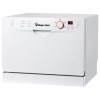Magic Chef MCSCD6W3 User Manual - Page 24
Troubleshooting Guidelines
 |
View all Magic Chef MCSCD6W3 manuals
Add to My Manuals
Save this manual to your list of manuals |
Page 24 highlights
TROUBLESHOOTING TROUBLESHOOTING GUIDELINES PROBLEM POSSIBLE CAUSES Dishwasher does not start. Fuse is blown or the circuit breaker has tripped. Power supply is not turned on. Dishwasher door is not closed properly. Water is not pumped from the dishwasher. Drain hose is kinked. Filter is clogged. Kitchen sink is clogged. Suds in the tub. Improper detergent used. Stained tub interior. White film on the inside surface of dishwasher. Rust stains on the silverware/cutlery. Spilled rinse aid. Detergent with a colorant was used. Hard water mineral deposits. The affected items are not corrosion resistant. Knocking noise in the washing cabinet. The spray arm is knocking against an item loaded in the rack. POSSIBLE SOLUTION Replace the fuse or reset the circuit breaker. Remove any other appliances sharing the same circuit with the dishwasher. A) Make sure the dishwasher is turned on and the door is closed securely. B) Make sure the power cord is properly plugged into the wall socket. Close the door securely by ensuring that the door latch is completely engaged. Check the drain hose and ensure that there are no kinks or obstrucƟons. Check the filter assembly and remove any debris, if any, and ensure nothing is blocking the filter. Check the kitchen sink for adequate drainage. If the kitchen sink is not draining you may need to contact a plumber to inspect your drainage pipe. Use only detergent specifically designed and marked for use with dishwashers. Always wipe away rinse aid spills immediately. If suds occur, open the dishwasher and let the suds evaporate. Wipe away any residue. Add approximately one gallon of cold water to the tub, then close and secure the door. Select the "PREWASH" program. Press the Start/Reset buƩon to drain out the water. Repeat the selected program, if necessary. Pause the wash cycle and rearrange the items accordingly, following the guidelines listed in the user manual. -PAGE 23-















